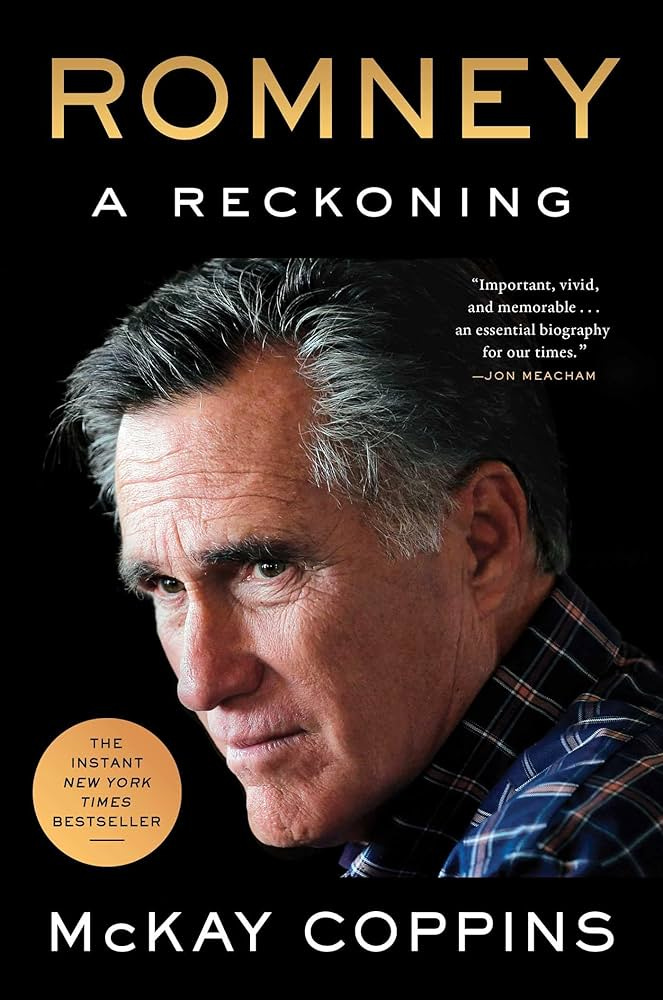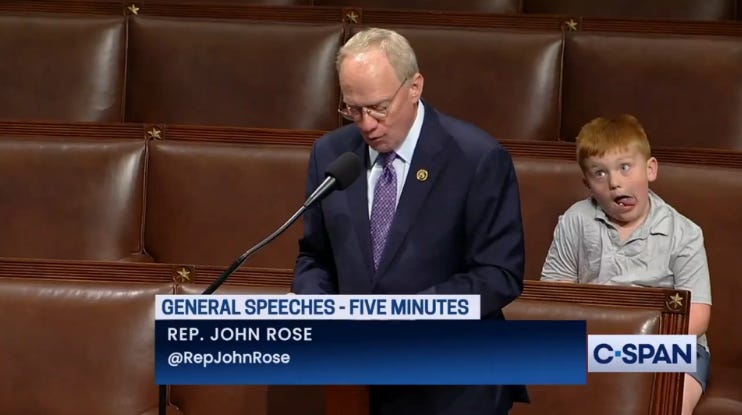Reading "Romney: A Reckoning" is a reminder that religious bigotry knows no party
And in case anyone still wonders if televisions affect behavior in Congress, meet Guy Rose
I’ve been listening to the audio version of McKay Coppins’ Romney: A Reckoning (Scribner, 2023). It is a very good book on many counts, not least because its subject is an extraordinary person. Mitt Romney has been a businessman, the governor of Massachusetts, the head of an Olympic Games organizing commission, a presidential candidate, and a senator. That’s quite a career.
Mr. Romney also is a Mormon, and has had to endure religious bigotry throughout his life. One portion of the book really hit me in the chest: the gross behavior toward Romney during his 2008 presidential campaign. It must have been dreadful to meet with various evangelical faith leaders and be quizzed on whether he believed in the Trinity and told that Mormons were apostates headed for Hell. Then there were his competitors, guys like Mike Huckabee who would ‘just ask questions’ about things like whether Mormons think Jesus and Satan were brothers.
Equally appalling were the media who treated Mormonism as an exotic and weird faith, and in some cases assailed it as extremism.
Jacob Weisberg of Slate snarked:
“I wouldn’t vote for someone who truly believed in the founding whoppers of Mormonism. The LDS church holds that Joseph Smith, directed by the angel Moroni, unearthed a book of golden plates buried in a hillside in Western New York in 1827. The plates were inscribed in “reformed” Egyptian hieroglyphics—a nonexistent version of the ancient language that had yet to be decoded…. He was an obvious con man. Romney has every right to believe in con men, but I want to know if he does, and if so, I don’t want him running the country.”
Damon Linker of The New Republic wrote:
“[A] recent poll showed that 43 percent of Americans would never vote for a Mormon—is rooted in ignorance and that this suspicion will therefore diminish as voters learn more about his faith. It is far more likely, however, that as citizens educate themselves about the political implications of Mormon theology, concerns about the possibility of a Mormon president will actually increase. And these apprehensions will be extremely difficult to dispel—because they will be thoroughly justified….
[E]xploring the complicated interactions between politics and the theological outlooks of specific religious traditions supposedly smacks of bigotry. The focus on Kennedy's Catholicism in 1960, for example, is today widely derided as a shameful expression of anti-Catholic prejudice that ought never to be repeated.
This is unfortunate… [C]ertainly, the political history of pre-Vatican II Catholicism—with its overt hostility to modernity, democracy, liberalism, and religious “error,” as well as its emphasis on the absolute authority of the Pope in matters of faith and morals—raised perfectly legitimate questions and concerns about what it would mean for the United States to elect a Catholic to the nation's highest office.
A very different, and arguably more troubling, set of questions and concerns are posed by the prospect of the nation electing a president who is an active member of the Church of Jesus Christ of Latter-Day Saints (LDS).”
Linker then spilled a lot of ink arguing that Mormonism was extreme and that if Romney believes its doctrine, well, maybe he would use presidential power to do something crazy. Linker later trashed Romney for “theoconservatism.”
All of this was gross at the time. Romney had held important positions and never had done anything nuts. He had a record of being a moderate, working with Democrats to enact a health care law that provided insurance to everyone in Massachusetts.
Nor could either author identify any Mormon elected official whose religious zeal led them to abuse power. For goodness’ sake, Orrin Hatch had logged 30 years in Congress when Weisberg and Linker were writing. The wildest thing Hatch had done was to record some music albums, like “Orrin Hatch’s Christmas Eve.”
I mean really—would anyone other than a bigot think it is o.k. to question whether a Muslim or Jew can be trusted in office because their religion might compel them to do something dastardly?
The anti-Mormon mudslinging looks even worse and all-the-more wrong in retrospect. Romney was a senator who took on tough, complex, thankless subjects, like the national deficit and national security issues. Whether or not you agree with his stances on various issues, nobody can say that Romney’s Mormon faith has made him an extreme elected official. Indeed, Romney has proven to be a man who resists the worst extremes of the increasingly-populist GOP, whose faith has kept him from taking the easy road and following the short-term incentives like trying to stop the counting of the electoral votes for president on January 6, 2021.
(Interestingly, Linker has reconsidered his view in recent years. He later called Romney “a genuine American hero” because Romney stood up to Trump, an—ahem—atheist with few moral scruples. Linker also said the GOP needed MORE Mormons because Mormons were against vulgarity and respectful of the law.)
As we all know, the religious bigotry got worse, and Barack H. Obama and Islam became its targets. Donald J. Trump, Glenn Beck, and various cranks began insisting the President was born in Kenya and a secret Muslim. But that is a whole 'nother story.
Going forward, here is to hoping that voters and the media who cover them will get past their priors on religious matters and instead focus their assessments on what matters: the content of candidates’ character, the work they have done, what they propose to do once in power, and how they will do it. We’d all be the better for it.






Romney's loss in the 2112 Presidential election has been the biggest tragic election outcome of the last 40 years. As President he would have worked across the aisle and given us a more prosperous and safer world.